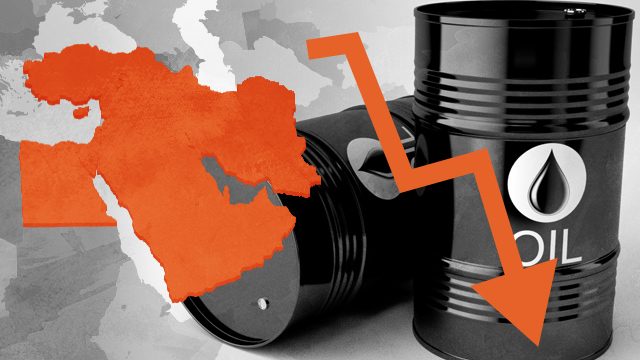SUMMARY
This is AI generated summarization, which may have errors. For context, always refer to the full article.

MANILA, Philippines – While low oil prices are generally good for the Philippines, its effect of slowing the economies of the Middle East may still affect the country through the almost 1 million land-based OFWs working there.
No region has been hit harder by the falling oil price than the Middle East. The region, home to most of the members of the Organization of the Petroleum Exporting Countries (OPEC), is host to the most oil dependent economies in the world.
Since OPEC’s announcement 18 months ago that its members would maintain supply levels, in a move to counter upstart North American shale oil producers, the oil price has dropped nearly 70%.
This has led to most of the OPEC nations cutting generous subsidies and public expenditures, most notably Saudi Arabia, the world’s largest oil exporter and the driving force of OPEC.
The kingdom ran a deficit of 15% of GDP in 2015 and projects a deficit of $87 billion for 2016.
The International Monetary Fund has also warned that the Saudi government, which relies on oil for 90% of its revenues, could run out of money within 5 years if it did not tighten spending.
The United Arab Emirates, Qatar and Bahrain have all cut spending as well.
Effect on the Philippines
The spending cuts are a worry as the majority of the big oil firms in these economies are state-owned and are thus a prime target for these cuts which will in turn affect employment.
OFWs groups and advocates have already raised the alarm saying that there are beginning to see reports of OFWs being terminated or facing pay delays. (READ: Retrenchment looms over OFWs based in the Middle East)
One such group, Migrante partylist, warned on February 17 that 50,000 Saudi-Based OFWs stand to lose their jobs by March due to the oil crisis.
These cuts would stem mostly from Saudi Binladin Group (SBG) and Saudi Oger Ltd., two of the biggest contractors hired by the Saudi government for construction projects.
Oil price not a direct cause
Labor Secretary Rosalinda Baldoz admitted in a statement on February 18 that the Department of Labor and Employment (DOLE) is concerned about the two firms, saying that they employ a large number of OFWs and are having problems that affect their workers.
She said however that the current oil price downtrend is not a direct cause of this, adding that the 50,000 potential job losses Migrante gave was inflated.
“Saudi Oger Ltd. has cases that have been recurring since last year, even before the global oil price downturn,” said Baldoz, who added that SBG was involved in the crane accident in Mecca last year and has been “penalized” by not getting contracts from the Saudi government.
Baldoz also added that Saudi Aramco, the national oil company “has expressed interest in continually hiring OFWs.”
Nevertheless, Malacañang has directed the DOLE monitor the situation and draw up contingency measures.
In response, the DOLE has stepped up its “Assist WELL” program, which provides welfare, employment, livelihood, and legal services assistance to returning OFWs by adding an Internet-based employment referral system called the Assist WELL e-System.
Since the beginning of February, DOLE has begun pre-registering all returning OFWs to it, said DOLE Undersecretary Nicon Fameronag who serves as Labor Communications Office head.
In an update on the program released on February 23, Baldoz said an overwhelming majority – 107 of 163 – OFWs who returned during the past two weeks and were assisted by the the program came home on account of various contract violations, and not due to the depressed oil price in the global market.
Fameronag added that other reasons for OFWs gave for returning included personal reasons, old age and request for transfers and that as of February 29, “only 8 were directly terminated because of the oil price decline”.
Latest jobs report
DOLE has also taken to instructing its Philippine Overseas Labor Offices (POLO) in each of the Middle Eastern countries to come up with weekly reports to monitor the situation.
Based on its latest report released the week of February 22 to 29, data showed the eastern region of Saudi Arabia saw a decrease in job orders, from 181 last week to 93 this week, with corresponding decrease in the number of contracts processed, from 665 last week to 516 this week.
There were no reports of terminations but SRACO, a private construction, consulting and maintenance company, was reported to possibly lay off its workers in the maintenance division due to the oil price decrease, DOLE said.
In Dubai, UAE, the POLO reported that land-based job orders processed during the first two weeks of February reached 986 compared to 1,067 during the same period last year, a 7.59% decrease.
Dole also said it received a request for assistance from 11 OFWs who were said to be terminated from Hallmark LLc, which it says is consistent with a slowdown in the Dubai retail sector due to the oil price.
On the other hand it pointed out that Emirates Flight catering had submitted a job order for 300 waiters and waitresses as well as 70 cleaners for Emirates Airlines’ added flights to the UK.
Data from Abu Dhabi, UAE showed a decrease in the number of job orders verified and processed, from 223 last week to 65 this week.
DOLE said there there were 14 terminations this week, all in the oil and gas sector, “but not on account of the oil price decline” but due mostly to personal reasons.
Qatar reported an increase in the number of job orders to 103 this week from 63 in the previous week.
The labor office in Kuwait reported no terminations due to the oil price decline, especially in the state-owned Kuwait Oil Company with DOLE adding that its chairman has even revealed an expansion plan in the next 5 years.
Similarly, no terminations were reported for Bahrain or Oman.
The report noted that the Department of Foreign Affairs (DFA) informed DOLE that 5 members of the Bahraini Parliament submitted a proposal for the non-renewal of employment contracts of half of expatriates in Bahrain to accommodate unemployed Bahrainis.

No red flags
Fameronag said that as part of the one-country team approach to OFWs, it is the DFA that would raise alert levels which DOLE would then follow.
“There is no alert level, so the situation is normal. But we are preparing for any eventuality and we are prepared. Anytime the DFA raises a red flag, we will activate our contingency plans that are in place in the event of a crisis ” he said.
Fameronag did concede however that “there are forces beyond our control. Like austerity measures enacted by sovereign governments” noting that a lot depends on the financial status of Middle Eastern firms, especially the Sub contractors.
Economists upbeat
Despite the uncertainty the Middle East faces, local analysts are generally upbeat that retrenchment won’t happen on a large scale and won’t effect the remittance flows that are still essential to the economy.
“There will be retrenchment but for redundant jobs. I believe that retrenchment won’t happen on a scale that will cause a considerable increase in the number of unemployed Filipinos,” said the Vice Dean of the Economcis program at the University of Asia and the Pacific (UA&P), Cid Terosa.
He added that ”although I don’t believe it will happen on a large-scale, our economy will still be able to fend for itself given our strong domestic markets and investments by the government and foreigners”.
The recently announced deal between Saudi and Russia to freeze oil production at January levels also bodes well as it is expected to provide a modest boost to oil prices.
“Over the short run, we should expect an increase in price but by the end of the year oil price will remain below $50 per barrel,” Terosa added.
Bernardo Villegas, research director of the Center for Research and Communication (CRC) and co-founder of UA&P is also not worried about Middle east remittances dropping.
In an article shared with Rappler, he said that over the last 10 years, despite the Great Recession and the precipitous drop in the price of oil in 2007 from $140 to $40 a barrel, there was not a single year that OFW remittances suffered a decline.
“In fact, the average growth over the last ten years’ ranges from 3 to 5 %. Even when total demand for overseas workers in the labor-short countries like Europe, the Middle East or East Asia actually declines, demand for Filipino workers either stays constant or even increases,” he said.
Villegas said this is due to Filipinos being a “cut above” as they possess soft skills like English proficiency that give them an advantage over other migrant workers. – Rappler.com
Add a comment
How does this make you feel?
There are no comments yet. Add your comment to start the conversation.